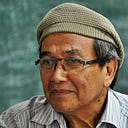Tuesday 16.03.2021- School Library
This morning I read about the lack of funding for school libraries in England. The article was written in The Guardian way back in 2015. Even though it was six years ago, a first world country, England should not have this issue. It is not unusual for my country Malaysia-still a developing country. We may have the best ERL city transport, but some of our school libraries are worse than third world countries. A few years ago, I visited two schools located in Pondok Beris in Kelantan, Malaysia. Both schools were founded by my late father Tok Guru Haji Awang Noh more than 60 years ago. The secondary religious school is Madrasah Amir Indra Putra with 1300 students and the primary school is Sekolah Kebangsaan Beris Kubor Besar with about 600 students. I was shocked to see the conditions of the school libraries. I saw only a few hundred books — old and outdated and no one seems to be borrowing any books and no one seems to be managing the libraries. The school administration and staff were not interested in getting the students to read books other than what is to be studied for examinations. If all the students were to borrow a book for one week, the library would be empty.
Why do I bother? The conditions of the libraries in both schools were no better than thirty years ago. Children should read more books to broaden their knowledge and minds as well as to inculcate the culture of reading and learning and subsequently enhance their thinking. Not just to pass the examination and satisfy the KPIs for the schools. Teaching is not just to pass the examination but it is also to educate the students for lifelong learning.
Personally, I was lucky to be chosen to learn in a full boarding school after my Standard Six Examination. I went to study in SDAR, Tanjung Malim from 1965–68. There were only ten of us from Kelantan in that year. After passing the Lower Certificate of Examination, I changed my school to study at Technical Institutes in Kuala Lumpur. Both schools have good libraries. When I was in Kuala Lumpur, I went to public libraries like the one at British Council. My love for reading was also attributed to my three years studying at Sheffield University in England for my civil engineering degree. In the early 1970s, we did not have personal computers and the web to get any info. Anything I need to refer to, I have to look for them in the university or city libraries. I only had access to the Web in 1995 and got my first email address from JARING. In 1995, I only knew five people who had emails. All my children studied and grew up in Kuala Lumpur. They have better access to libraries compared to my village folks in Bachok. Even today, Bachok as a district does not yet have a proper district library. The state is too poor for such indulgence.
Most of the rural school children in Kelantan are too poor to buy extra books to read. I met the headmaster of my former school, Sekolah Kebangsaan Pa’ Pura. According to her 75% of the parents are eligible to get free school books for their children due to their lower incomes. Most schools do not have enough funds to buy books for the school library. Internet connectivity is very slow and poor and many parents cannot afford them. Poor students do not have smartphones like those in urban areas. So, for the children of rural students, libraries are important for them to get books of knowledge. The schools must be funded and the libraries must be well managed. Teachers must be trained to manage the libraries.
Academic qualifications are not enough for these rural children to compete against more urbane and sophisticated students from urban areas. The cycle of mediocrity and poverty(low income) will continue without positive interventions by government agencies or NGOs.
